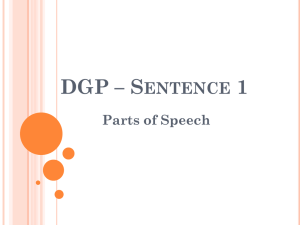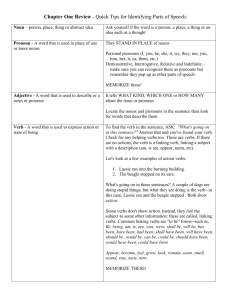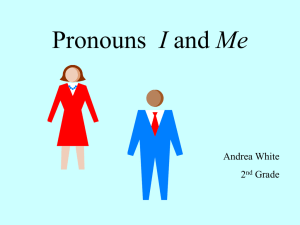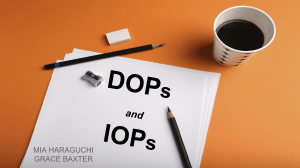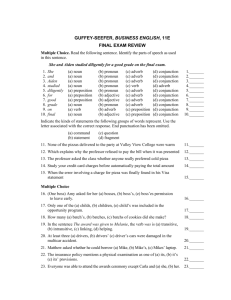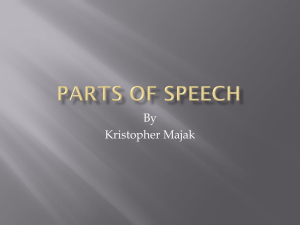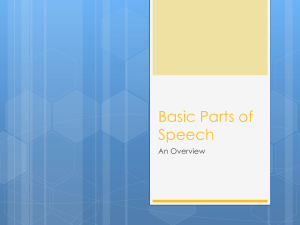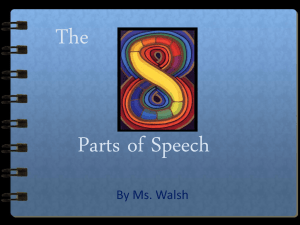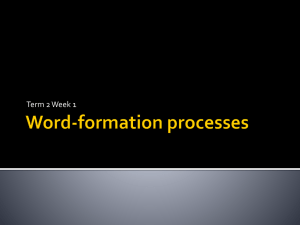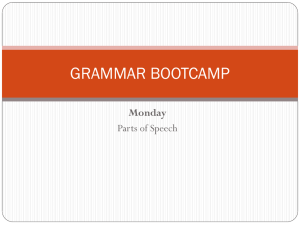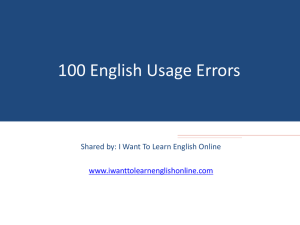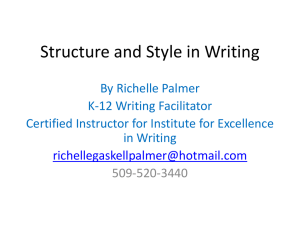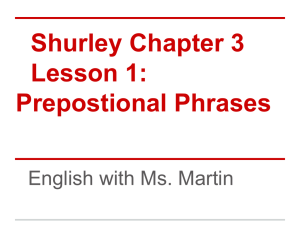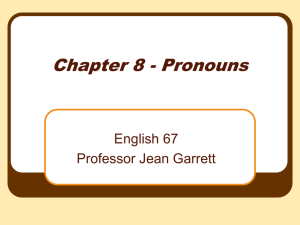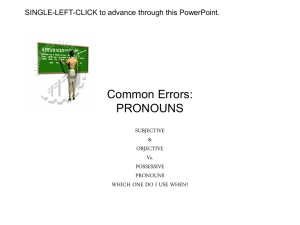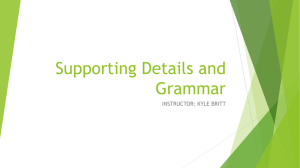Grammar notes can be found here
advertisement
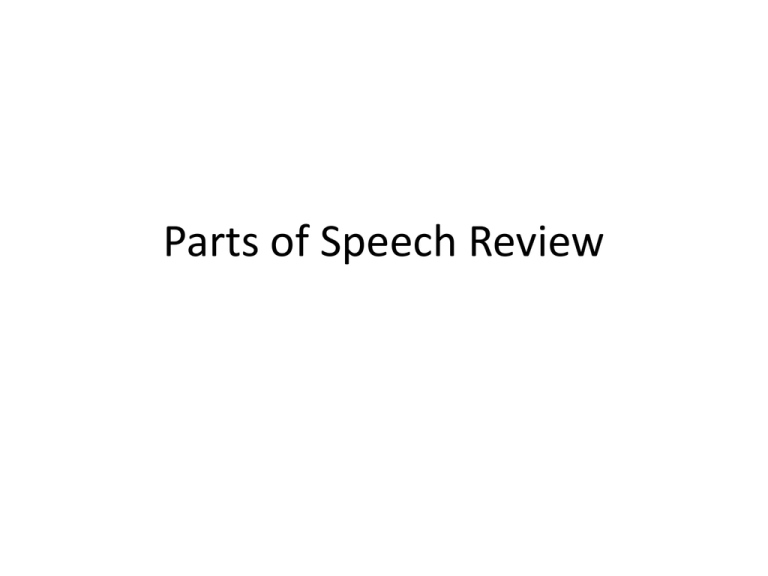
Parts of Speech Review Noun A word or word group that is used to name a person, place, thing or idea. Examples: Persons: teacher, chef, Nathan, Places: Grand Canyon, city, kitchen Things: lamp, Nobel Prize, iphone Ideas: happiness, self-control, liberty, bravery Types of Nouns Common and proper Abstract and concrete Collective Collective Nouns A noun that names a group Examples: Audience Batch committee crew herd family quartet team Practice 1. The Houston Texans will go to the Super Bowl this year. 1. David visited an interesting museum in Colorado last month. 1. Izzy went to live at my sister-in-law’s house until we return. 1. People should always tell the truth. 1. We joined the committee. Pronoun A word that is used in place of one or more nouns or pronouns. Examples: Ask Dan if Dan has done Dan’s homework. Ask Dan if he has done his homework. Both of Tori’s friends said both would help Tori find Tori’s missing books. Both of Tori’s friends said they would help her find her missing books. Antecedent The word or word group that a pronoun stands for Examples: (ant.) (pro) (pro) Frederick, have you turned in your report? (ant.) (pro) Walking the dog is fun, and it is good exercise. Personal Pronouns Refers to the one speaking (first person), the one spoken to (second person), or the one spoken about (third person). Examples: First Person Second Person Third Person Reflexive Pronouns Singular I, me, my, mine you, your, yours he, him, his, she her, hers, it, its Plural we, us, our, ours you, your, yours they, them, their, theirs Refers to the subject and is necessary to the meaning of the sentence Examples: Myself, ourselves, yourself, yourselves, himself, itself… Intensive Pronouns Emphasizes a noun or another pronoun and is unnecessary to the meaning of the sentence Demonstrative pronoun Points out a person place, thing or idea Examples: This That These Those Interrogative pronouns Introduces a question Examples: What Which Indefinite pronouns Who Whom Whose Refers to a person, place, thing or idea that may not be specifically named. Examples: All each Any either many more nobody other none several Practice 1. The drama teacher said she would postpone the rehearsal 2. Does Michelle, who is traveling to Thailand, have her passport and ticket? 3. “I want you to study,” Mrs. Yee says to the class. 4. The students made lunch for themselves. 5. Of all United States Olympic victories, perhaps none were more satisfying than Jesse Owens’s 1936 triumphs in the 200meter dash and broad jump. Adjectives A word that is used to modify a noun or pronoun Modify means to describe the word or to make its meaning more definite Tells what kind which one/ones how much/many Examples: Seventh grade Several days No marbles Italian children Articles The most commonly used adjectives a, an, and the Practice 1. On winter afternoons, I sometimes walk home after band practice rather than ride on a crowded, noisy bus. 2. I hardly even notice the heavy traffic that streams past me on the street. 3. The wet sidewalk glistens in the bright lights from the windows of stores. 4. The stoplights throw green, yellow, and red splashes on the pavement. 5. After I turn the corner away from the busy avenue, I am on a quiet street, where a jolly snowman often stands next to one of the neighborhood houses. Verb A word that expresses action or a state of being Examples: We celebrated the Chinese New Year yesterday. The holiday is usually in February. Action Verb A verb that expresses either physical or mental activity Examples: Owls hooted all night. Mrs. Byler plays volleyball. She thought about the problem I believe you. Linking Verbs A verb that expresses a state of being. It connects, or links, the subject to a word or word group that identifies or describes the subject. Examples: Channing Tatum is an actor. The children remained quiet. Be Verbs Am To be is being was been were are Other linking verbs Appear Look Sound grow smell turn seem taste stay feel become remain Some can be both action and linking: Amy looked through the telescope. Amy looked pale. Helping Verbs also known as an auxiliary verb, it helps the main verb express action or a state of being Examples: Can speak Were sent Verb phrase has been named should have been caught Contains one main verb and one or more helping verbs Practice 1. Have you ever visited Redwood National Park? 2. The giant trees there can be an awesome sight. 3. For centuries, these trees have been an important part of the environment of the northwest United States. 4. More than 85 percent of the original redwood forest has been destroyed over the years. 5. With better planning years ago, more of the forest might have been saved. Adverbs A word that modifies a verb, an adjective, or another verb. It makes the meaning of a verb, adjective, or another adverb more definite. They answer the following questions: Where When How How often or How long To what extent or how much Examples: The sprinter ran swiftly. I read the funny pages early on Sunday morning. Jolene was comforting a very small child. Adverb or Adjective? Many adverbs end in –ly. These adverbs are generally formed by adding –ly to adjectives. Adjective Clear Quiet Convincing + -ly -ly -ly -ly = = Adverb clearly quietly convincingly Which is correct? I am having a (real, really) good time. Tim drove (safe, safely). He spoke too (quiet, quietly). Practice 1. In this story, a nameless character goes outdoors on a terribly cold day in the Yukon. 2. Soon both the dog’s muzzle and the man’s beard are frosted with ice. 3. Along the way, the man accidentally falls into a stream. 4. Soaked and chilled, he desperately builds a fire under a tree. 5. Based on what you now know about the story, what kind of ending would you write for “To Build a Fire”? Prepositions A word that shows the relationship of a noun or pronoun to another word. Examples: The cat walked through the door. The cat walked toward the door. The cat walked past the door. Practice 1. We practiced karate ________ dinner. 2. She jumped up an ran _______ the park. 3. A boat with red sails sailed ______ the river. 4. The hungry dog crawled ______ the fence. 5. Put the speakers ______ the stage. Prepositional Phrase Includes the preposition, a noun, or pronoun called the object of the preposition, and any modifiers of that object. Examples: You can press those leaves under glass. Fred stood in front of us. The book in my new bag are heavy. Practice 1. Robert Peary and Mathew Henson searched for the North Pole for many years. 2. Henson traveled with Peary on every expedition expedition except for the first one. 1. However, for a long time, Henson received no credit for his role. 1. Peary had hired Henson as an assistant on a trip Peary made to Nicaragua. Preposition or Adverb? Some words can be used as both. Remember that a preposition ALWAYS has an object and an adverb NEVER does! If you can’t tell whether a word is used as an adverb or preposition, look for an object. I haven’t seen him since. I haven’t seen him since Thursday. The bear walked around. The bear walked around the forest. Conjunction A word that joins words or word groups Coordinating Conjunction Join words or word groups that are used in the same way Examples: And But So Yetc For Nor Or Josie, Hanna, Jill, or Anna Across town, over the river, and through the woods • Coordinating conjunctions that join independent clauses are almost always preceded by a comma. When for is used as a conjunction, there should always be a comma in front of it. c Correlative Conjunctions Pairs of conjunctions that join words or word groups that are used in the same way. Examples: Both…and Either… or Whether…or not only…but also neither… nor Both Bill Russell and Larry Bird played for the team. She looked neither to the left nor to the right. Practice 1. I wanted to go to the beach, but it rained all weekend. 2. Our class is recycling not only newspapers but also glass bottles and aluminum cans. 3. He set the table with chopsticks and rice bowls. Interjections A word that expresses emotion Examples: Aha ouch Hey oh Hurray oops wow yikes well Ouch! That hurts Aha! I know the answer. Oh, I wish it were Friday. Well, what have you been doing? Practice 1. _____! The heel just fell off my shoe. 2. There’s, ______, seven dollars in my wallet. 3. _____! Squirrels, stop eating my food!


